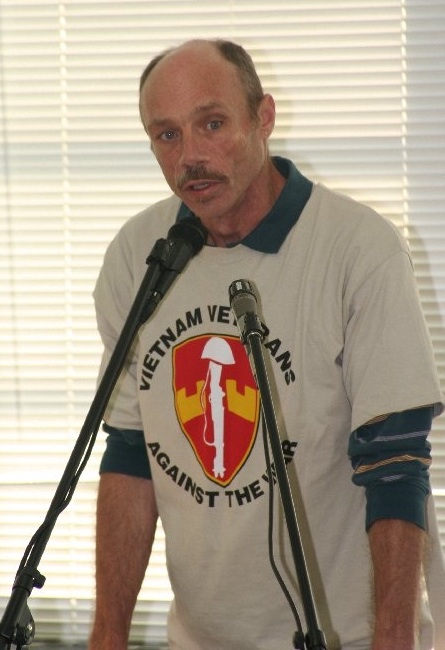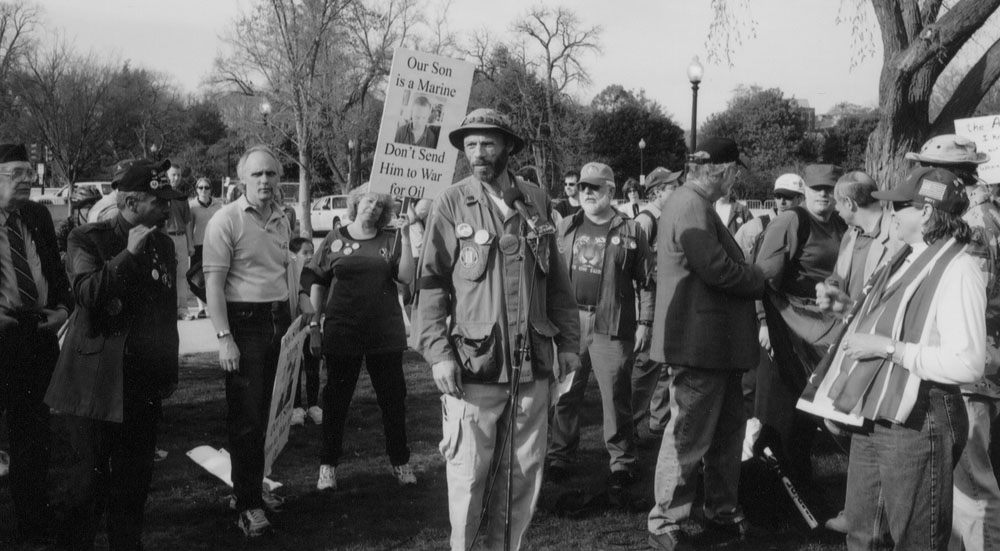 |
Dave Cline: 1947-2007By Ben Chitty
This eulogy was delivered at David Cline's funeral, September 19, 2007, Jersey City, New Jersey. Ben Chitty is a long-time member of Vietnam Veterans Against the War. My name is Ben Chitty. I'm here on behalf of Vietnam Veterans Against the War to say a few words about my friend David Cline. There are people here who knew him longer, people here who saw him more often, people here and everywhere who speak better than me. But Dave Cline recruited me back into VVAW more than twenty years ago, and that's why I'm here. Cast your mind back to the mid 1980s. Reagan was in the White House, and quashing our country's all too brief flirtation with a new kind of foreign policy. The CIA and the War Department were reviving old tricks and rehearsing some new ones – in Afghanistan, in Lebanon, in Grenada, in Honduras, El Salvador, Nicaragua. The lessons we had paid so much to learn in Vietnam were being rewritten, or obliterated entirely. Meanwhile the Veterans Administration seemed to have decided that the best way to deal with Agent Orange exposure was to wait until we were all dead, and no one seemed to know or want to know how many of us were homeless or incarcerated. Being a Vietnam veteran in America in 1985 could be a very surreal experience, especially for someone like me who had put all that aside when Saigon fell in 1975. Dave Cline and Clarence Fitch had set about reestablishing VVAW as a presence in the city where the organization had started nearly twenty years before and, among others, they found me – actually my wife introduced me to them. Dave was energetic and charismatic. He was smart. And he had a very loud voice. But what made him a leader was his politics. He had taken the experience of soldiering for the empire, analyzed it in terms of American history and politics, and seasoned it with his natural-born sense of solidarity with working people. He studied peoples' movements, liberation movements, veterans' movements. He thought long and hard about how veterans fit into the broader movement for peace and social justice. He worked to defend and spread the legacy of VVAW. Sometimes this meant organizing the 20th reunion in 1987 and the 25th reunion in 1992. Sometimes it meant helping to organize the 25th reunion of the liberation of Saigon in 2000. Day to day and week to week it meant speaking to students about military service and about Vietnam. I guess he spoke to thousands of kids over the years. He worked to organize veterans. He worked on the Agent Orange issue and, more generally, on military toxic exposures from atomic bombs to unexploded ordnance. He organized support for services for veterans. He organized forums and regional meetings, coalition after coalition. One of the projects nearest to his heart was the Jersey City Vietnam Veterans Memorial Committee, which he helped start ten years ago. He looked for ways to confront the empire. Moral stances did not interest him, nor did imaginary impossibilities. But he did like to push the envelope, raise the ante, try something new. Like the 1987 Veterans Peace Convoy to Nicaragua. Dave helped organize the East Coast branch, led by the Mercedes deuce and a quarter diesel truck bought by the New York-New Jersey Chapter. The convoy challenged the US embargo on Nicaragua head on. After an epic confrontation with the Justice Department at the border in El Paso, the convoy slipped into Mexico and drove on to Managua. I heard a few years ago the truck was still running. The Vieques campaign was another challenge to the empire. The Navy had been using the island for target practice for decades, and the people were determined to bring this to an end. In 1999 Dave started "Veterans Support Vieques" in New Jersey, New York and Puerto Rico to support the struggle. It became the longest-running civil disobedience campaign in US history, and ended finally in victory in 2003. When 9-11 happened, Dave Cline was probably the single best qualified person in the world to take on the leadership of Veterans For Peace. So he did. The Vietnamese Buddhist monk Thich Nhat Hanh introduced me to the concept of the hungry ghost. In Vietnamese culture the spirit of anyone who dies and cannot be properly buried at home with his family is doomed to wander around angry and hurt, breaking rules, stirring up trouble, devouring sustenance without satisfaction, until his body can be properly laid to rest. Dave always seemed to me to be a hungry ghost. As it turned out the wounds he got in Vietnam were fatal. But Dave's story is more than the biography of one person. He is representative of a generation of veterans. The Vietnam experience has been the hungry ghost of American society for all my adult life. And because we never worked through what exactly that experience meant, we are making newer and hungrier ghosts every day in Afghanistan and Iraq. That story is far from over. Dave was notorious for calling out cadences as he led contingents of veterans on marches and into rallies. A cadence keeps us in formation so we're not just strolling along the avenue. It trumpets our presence, heartens our friends, challenges our foes. It demands "who's the real patriot here?" and just asking that question answers it. And often it will get you on the radio, sometimes even on TV, which is cool. A good cadence is deceptively hard to write and harder to produce in the heat of the moment. I should know – I wrote a lot of them which Dave didn't much like. They went on too long, got too involved, tried to make too many points. But I did write one which made it into his repertory, and that's how I'm going to end.
Lift your head and hold it high Hoa binh, Dave Cline. Go in peace.
|



